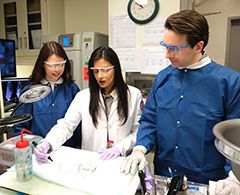The Division of Anatomic Pathology possesses 35 outstandingly qualified faculty members who provide a comprehensive range of diagnostic services with strong emphasis on the highest quality patient-care based on diagnostic accuracy, state-of-the-art technologies, and personalized service to client
The services provided by the faculty members of the Department of Pathology and Laboratory Medicine at NewYork-Presbyterian/Weill Cornell Medical Center are essential for optimal patient care. An accurate diagnosis is crucial for patients to receive the most effective therapies. The expertise of our internationally recognized pathologists — most of whom have subspecialty training — ensures the greatest chance of an accurate diagnosis and solid footing on that first critical step on a patient's journey. Our services are also widely employed to monitor patients' response to therapy and to predict prognosis.

Prominent among our faculty are several authorities in the areas of hematopathology, dermatopathology, nearly all surgical pathology subspecialties, and laboratory medicine. Building on their expertise, we have developed a nationwide diagnostic and patient management consultation service in support of our reference laboratory services. We also provide our expertise internally to support Weill Cornell.
Clinical Divisions
The Division of Hematopathology includes 11 faculty members with dedicated subspecialty training and experience in the comprehensive diagnostic evaluation of hematologic disorders, many of whom are internationally recognized for their clinical and research efforts.
The focus of the Molecular and Genomic Pathology Division is to provide Weill Cornell Medicine physicians with molecular information that will facilitate the diagnosis of diseases, monitor the prognosis of the patients and assist in the selection of appropriate therapeutic options.
The Weill Cornell (WCM) Campus, the quaternary academic medical center, has three regional hospitals associated with it within the WCM Sphere. On July 1, 2013, NewYork-Presbyterian Hospital (NYP) announced that New York Downtown Hospital had become its newest campus.
Experimental Divisions
The Division of Cell and Cancer Pathobiology, led by Dr. Jorge Moscat, is constituted by research laboratories whose overarching goals are to unravel the molecular and cellular basis of human diseases.








